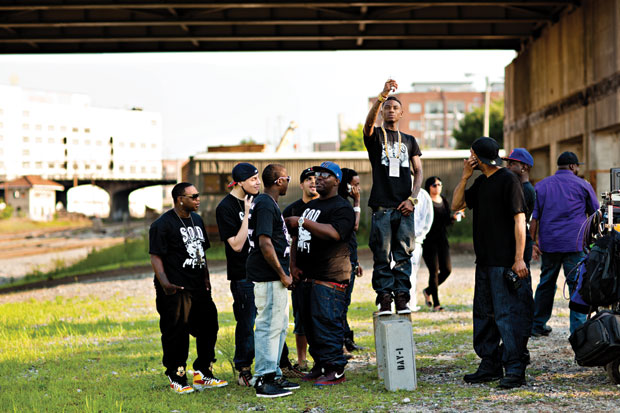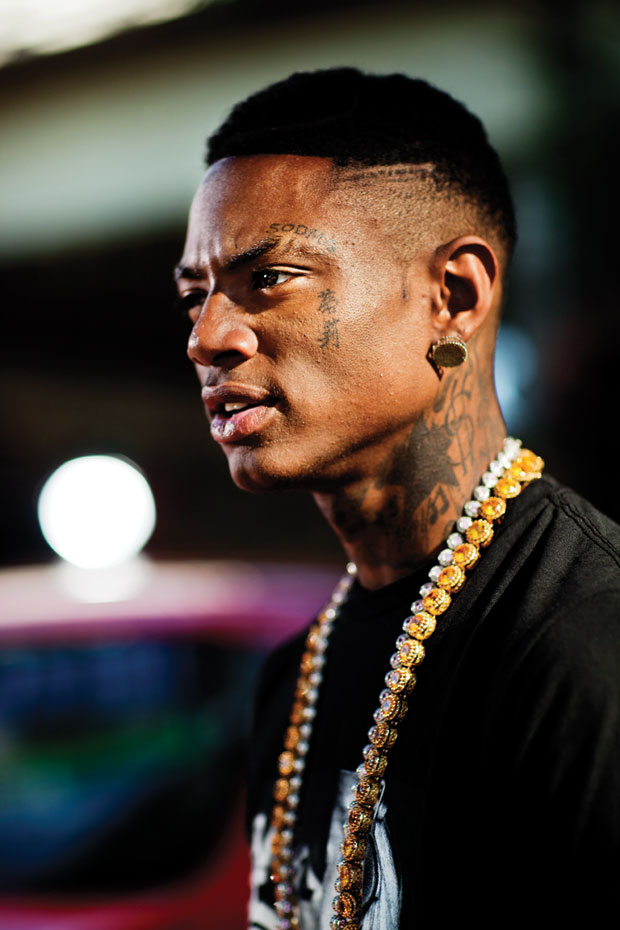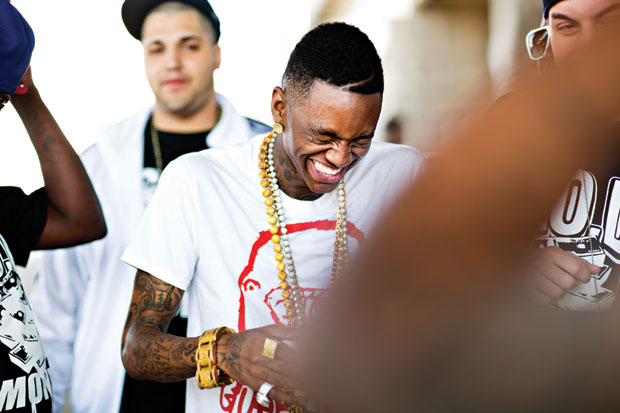After six years of hits, Soulja Boy is releasing the best music of his career. He’s got a million bucks in the bank, a legion of fans and a steady supply of downers. Freshly 21, he’s hoping growing up won’t hold him back.
This spring, Soulja Boy, the 21-year-old rapper, appropriated Tupac’s image for Juice, a mixtape inspired by the late icon’s performance as the demented goon Bishop in the movie of the same name. Though he was only six years old when Tupac was gunned down on the Las Vegas strip following a Mike Tyson fight, Soulja Boy adores Tupac. He’s currently planning a remake of Juice, the film, casting himself as a 2011 Bishop, the announcement for which impelled near unanimous blind rage, voiced most prolifically in the comment sections of music blogs. Hip-hop holds Tupac in a religious regard, a martyr of his own California love whose outsized regional pride became one of his clearest identifiers. Soulja Boy is well aware of what people think of Tupac and also what they think of him trying on Pac’s clothes, but the faceless vitriol of the internet matters very little to someone who’s been a millionaire since he was a teenager.
Before speaking with Soulja Boy, I stared at him for some eight hours one balmy spring Saturday, waiting in the wings at a video shoot for “Juice,” the title track from his new mixtape. Beneath a secluded overpass, less than a block from Atlanta’s Georgia Dome sports complex, Soulja Boy pantomimed lyrics in front of a cherry red 2012 Bentley GT, his latest gift to himself. “Juice” is the third video in as many days he’s shot with director Rage. It is the second one for the song, the first taking place in a jewelry store, with Soulja Boy rapping between sips from a white Styrofoam cup while his friends try on jewelry. In both, his hair is styled in an imperial Gumby cut with a deep swirl part, which is barbershop speak for a bi-level fade separated by a curvy line shaved up the middle. The cut is a Generation Swag update on the one Tupac wore during Juice. When he wasn’t taking instruction from Rage, Soulja Boy was sequestered on a tour bus, emerging from his smoking sessions with eyelids at half mast, energy level somehow intact. In fact, the only time he sulked was when he found out that they’d run out of weed on set.

Since his beginnings as a tween idol in a necklace made of rubber bands, Soulja Boy’s image has taken a sharp turn towards the thuggish. He has more tattoos on his face than most people have on their entire body, and he has become increasingly comfortable smoking weed and drinking lean—a mixture of soda and prescription-only Promethazine/Codeine cough syrup—on camera. The easiest explanation is that he sees in himself the faithfully unhinged, new millennium rock star persona of friend and influence Gucci Mane. Gucci Mane, however, has a long and storied history of living on the fringes of society, madness Soulja may just be mimicking for effect. “I look how I look, but I got a good spirit,” Soulja Boy says. “I always want to give out a positive image [and] I feel like I’ve been doing a good job. But at the end of the day, I ain’t raising everybody kids in America. My dad raised me. No rapper influenced my life decisions and shit. I learned from my father and mother.”
DeAndre Cortez Way’s life as an artist began like most, up late school nights, homework undone, writing raps in a cramped bedroom. As a kid he split time between his mother’s house in the infamous Zone 1 section of Atlanta and his father’s in rural Batesville, Mississippi until he made the jump permanently to live with his father at 14. There he had access to a home computer and a pirated copy of Fruity Loops, the production software on which he created his earliest songs, including “I Got Me Some Bathing Apes,” an ode to the trending luxe Japanese sneaker that earned him paying gigs as a 15 year old at sweet 16 parties. “In the ninth grade, that’s when my grades started going down,” he says. “At that point, I felt like I was smarter than everybody at school. Teachers couldn’t tell me shit. The mindset I got now, I was using that in high school.” He made his earliest music available through SoundClick, an all but forgotten free-for-all of aspiring artists looking for an ear. Things really took off when he and childhood friend Arab began uploading videos of themselves to YouTube rapping their homemade songs in Soulja Boy’s driveway, performing popular Atlanta dance steps, and in one instance, piloting an unmanned luggage cart through an airport. “I was the first rapper on YouTube,” he says. “You can look that shit up. Go ask YouTube theyself.”
Unsubstantiated claims of YouTube domination aside, the video for Soulja Boy’s 2007 debut single “Crank Dat (Soulja Boy),” has over 100 million views on the video hosting site today. Between performance shots of a 17-year-old Soulja Boy (clad in backwards Evisu jeans and a giant white Superman hoodie) leading dancers through the song’s accompanying dance routine, the video serves as a dramatic reenactment of his ascension. In its opening scene legendary Atlanta producer Mr. Collipark sits desk side stumped, until some kids mysteriously appear in his office dancing and singing “Crank Dat (Soulja Boy).” Collipark is prompted to ask, “Who is Soulja Boy?” and what it is they’re doing (the dance, not why they are in his office). The children are appalled by his ignorance. Upon some cursory internet research, Collipark discovers that Soulja Boy is the prince of the internet and offers to sign him via instant messenger.

Soulja Boy’s 30th floor penthouse in the Buckhead section of Atlanta, looks a lot like the set of Blank Check, the 1994 Disney film about a discontented boy who is granted a blank check to pay for a damaged bicycle, which he cashes for one million dollars, purchasing a house and filling it with the most expensive toys he can find. Soulja Boy’s living room is outfitted with arcade-size video game stations, a pair of Segways, a number of unattended laptops and an entertainment system so expansive that it could only have been dreamt up by someone who installs entertainment systems for a living. I wander around, waiting for him to finish smoking on the balcony, admiring the selection of Soulja Boy promo photos adorning each wall and just past an empty pizza box on the kitchen counter, a cabinet’s worth of assorted vitamins.
When we sit down to talk, Soulja Boy turns on Gears of War, an apocalyptic video game for the Xbox. His TV screen is so large it looks like we’re peeking out on a wasteland through the window of an abandoned silo. Also in the room, having paused the continuous orbit of their sun, are the various members of Soulja’s entourage, SODMG (Stacks On Deck Money Gang), all wearing the same SODMG promo T-shirt. Present today are childhood friends Killa Cam, Rashad and Tonio, Soulja Boy “cameraman,” M2ThaK, and Spinning 9, an SODMG rapper from Germany who looks the absolute happiest to be in the room. Though his peers would surely love to be him, they seem just as happy to simply be his friend.
I try to begin by addressing the mutiny over the Juice remake, but he dismisses it altogether, far more excited to talk about further developed opportunities, including a full length Soulja Boy documentary set to release this fall and a role in an upcoming film called Officer Down, which he seems to have landed on the basis of his Juice ambitions alone. He at first says that he feels like a young Russell Simmons before correcting himself to declare that he wants to accomplish things that no one else has at his age. “Every time I meet someone that’s older than me that’s a vet in doing what I’m doing, they always be like, ‘I wish I could’ve started when you started,’” he says. “I just be trying to do as much as I can do when I’m still young. Cause it sounds like when you get old, that shit ain’t whassup.”

At 21, Soulja Boy is growing old physically more than mentally, but he’s already accomplished more than most artists ever will, regardless of genre. His touchstones are immeasurable, but as the first internet sensation of his kind, he managed to leapfrog the archetypal stepping stones of hip-hop credibility in one broad jump, never having represented his neighborhood, city or region in a democratic sense. “I’m from Atlanta,” Soulja Boy says. “I’m from Simpson Road, Zone 1. I feel like when people look at me, they don’t be like, ‘I fuck with shawty because he from Simpson.’ They fuck with me because they fuck with me, the person. My spirit, my aura... I got a good personality. I’m a cool dude. All my fans are my fans for a reason. It ain’t just about where you from. I’ve got people that love me from Brazil, people from Germany. People from all over the world hit me, and it be amazing me. I don’t think they got it in they head like, he’s from Atlanta.”
The people who have made that type of headway, dirty south heavyweights like TI, Young Jeezy and Gucci Mane are the sons of Atlanta grown straight from red clay. They released mixtapes that spoke directly to the people they had access to, the communities that became their earliest supporters. Soulja Boy’s Juice mixtape is the closest he’s come in his career to touching the road. Hosted by veteran mixtape DJs Scream and Swamp Izzo, Juice is a reflection of the Atlanta club scene, an all-the-way-turnt-up compilation of songs built on wobbly pillars of bass and autotuned rap-singing over wheezy garden organs. A fair amount of the production and, to a lesser extent, swag, can be attributed directly to the influence of Zone 3 title holder and recent SODMG-signing, producer/rapper Kwony Cash.
Before Kwony though, Soulja Boy had proudly aligned himself with Bay Area weirdo and Twitter champion, rapper Lil B. Last summer, the two dropped Pretty Boy Millionaires, a mixtape collaboration that contained “Cooking Dance,” a song exalting Lil B’s most infectious legacy, and the one at the end of which B conjointly declares, This our cooking dance. The tape could have cemented Soulja as one of Lil B’s earliest adapters, but instead provoked accusations of outright swagger jacking when Soulja Boy continued to record in B’s sloppier “based” style. Soulja Boy, however, attributes his interest in B and other rappers to generational synergy, a “we’re all in the same gang” free exchange of art and ideas. This is especially dubious with regard to Soulja’s considerable visibility, but maybe less so in light of the innumerable “Crank Dat” imitations he endured when he broke the scene. “Everybody go about things differently,” he says. “Everybody create they own destiny. Me, I just go in and have fun, rap about what the hell going on, what I’m doing. If I ain’t doing this shit, it just happens to happen.”

After our conversation—which he assures me was broadcast on Xbox live—we listen to tracks from Juice in the corner room studio of the penthouse. He tells me the tape is his “latest work,” save for a remix of “Mistress,” now featuring Waka Flocka, whose voice he sampled for the chorus of the original, and a remix of Kwony Cash’s “All in It,” a soon-to-be parking lot serial killer whose bass kicks feel like what you would hear if someone pulled up the club in a sterling white hovercraft. Seconds into “All in It,” Soulja Boy is risen, called out into the living room dance floor by the iridescence of his own Auto-Tuned voice. Plastic travel souvenir cup full of lean in one hand, blunt in the other, he scrunches his face, hitting a gooey two-step by himself, but only until his SODMG solar system falls back into place, circulating their medicine man in rhythm. Soulja got the juice and no one’s going to tell him any different.
Our final meeting feels like a debriefing. He claims to have had an epiphany that very morning and has decided to stop smoking weed and sipping lean altogether. The previous day he’d worn a life-sized, diamond encrusted replica of a Swisher Sweet box around his neck, Swisher Sweets being the rap cigar of choice to break down and roll into blunts. He says that though he never felt slowed by his vices, they weren’t making him any smarter or making him any money. He admits that he’s tried to quit before, but this time it’s real. He’s got more eyes than ever watching him, both in adoration and abhorrence, and he’d like to be clear minded for the rest of the ride. Not long after his initial declaration, I overhear him unpacking the decision to SODMG, settling on one last provision. “If y’all see me smoking or sipping, y’all gotta stop me,” he pleads. After a quick pause he continues. “Actually, just let me do that shit.”



